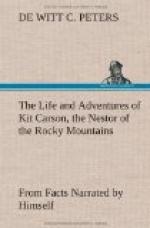The company of trappers which had been so fortunate as to secure the services of Kit Carson, for facts seem now to warrant us in employing this language of just praise, set out for the Yellow Stone River, which stream they safely reached, and on which they set their traps. Dame Fortune here seemed to be in unpleasant mood. Crossing the country from the Yellow Stone to the Big Horn River, they again courted the old lady’s smile with stoical patience, but with no better results. They next extended their efforts to the three forks of the Missouri River; also, to the Big Snake River. The fickle old lady proved scornful on all these streams, and finally, on the latter stream and its tributaries they wintered.
In this section of the country they fell in with Mr. Thomas McCoy, a trader who was in the employ of the Hudson’s Bay Company. In his trading operations Mr. McCoy had been unsuccessful and had concluded to organize a trapping expedition. The inducements which he held out led Kit Carson and five of his companions to become members of his party. With him they traveled to Mary’s River,[10] from whence reports had circulated that beaver existed in great abundance. The party struck upon this stream high up and slowly followed it down to where it is lost in the Great Basin. Their success here was not satisfactory; consequently, the party returned to the Big Snake River. By McCoy’s direction the party tarried upon this river for some time when it was divided. McCoy and a small escort started for Fort Walla Walla. Kit Carson and the majority of the men took up their line of march for Fort Hall. While en route, the latter division was subjected to the greatest privations imaginable. Among the worst of these was hunger, as their trail led through a barren region of country. For a short time, they managed to subsist upon a small supply of nutritious roots which had been provided in advance. This source finally gave out, when their affairs assumed a most desperate attitude. To keep from starving, they bled their mules and drank the warm red blood with avidity, so acutely had the days of fasting sharpened their appetites. This operation, however could not be repeated without endangering the lives of their animals. These also were on a short allowance of food, for the grass was very poor and scanty. The whole party had become frightfully reduced in strength, and began to think it necessary to kill some of their animals, which at this time they could but ill spare. In this terrible condition they met with a band of Indians who proved to be of a friendly disposition. The party was then only about four days’ journey from Fort Hall. Most unhappily, the Indians themselves possessed but a scanty supply of provisions, and no more than their immediate wants required. It was not without considerable manoeuvering and talk, during which all the skill and Indian experience possessed by Kit Carson were brought into active requisition, that the savages were prevailed upon to trade with the trappers. By the trade the half famished men obtained a fat horse, which was immediately killed, and on which they regaled with as much relish as the epicure in the settlements enjoys his “joint of roast beef.”




